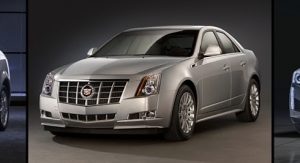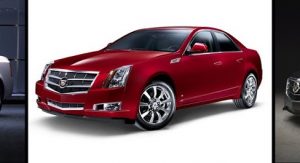Cadillac, one of the oldest names in the world of premium automobiles, has had its ups and downs over the 111 years of its existence, ranging from innovations like the first commercially available V8 engine in the U.S. on the 1914 Model 51 and styling revolutions such as tailfins and wraparound windshields in the late 1940s and 1950s, to failures like its diesel adventures of the late 1970s.
After a long period of letdowns, the year 2003 brought about the first modern Cadillac, the CTS, which helped the wreath and crest company enter the 21st century and defined its brand image more than any another effort in recent times.
The first CTS marked the production debut of Cadillac’s edgy “Art and Science” design language that was first seen on the Evoq concept car and which has been applied on every single Cadillac model since then.
Designed to replace the Catera, the chiseled CTS Mk1 was competent, especially in 400hp CTS-V trim, but not as refined and hard around the edges (pun indented) over its German rivals from Audi, BMW and Mercedes-Benz.
The second CTS was a new proposition. While visually-related to the first CTS, the 2008 model-year car was a lower and sleeker-looking vehicle. It also made its mark on the performance scene, with the Corvette-engined CTS-V, which had a staggering 556 hp as it left the factory gates. Then, the two-door and wagon versions (both available as a –V) came along, and by 2010, Cadillac had an entire range of CTS models.
Now, we’re in 2013, and it’s time for a considerably more modern looking CTS, all new for the 2014 model year. Ever since it was revealed at the New York motor show last month, the CTS has made many headlines, and all sorts of praise has been thrown at it.
The exterior was clearly drawn by people who have studied the segment well. The CTS looks modern and you would not mistake it for anything else, from any angle really – it has characteristic and very unique lights front and back and the grille is massive and nicely puts the badge into context.
Now, since the CTS is turning heads, we thought it would be a good idea to just put the three generations of the model side by side, for the evolution to be more clearly visible. What becomes evident is the fact that you can still see the family ties, if you will, between the first and the third model – a good thing, considering the fact that when some of the other manufacturers do this, their cars begin to look the same.
By Andrei Nedelea
PHOTO GALLERY















